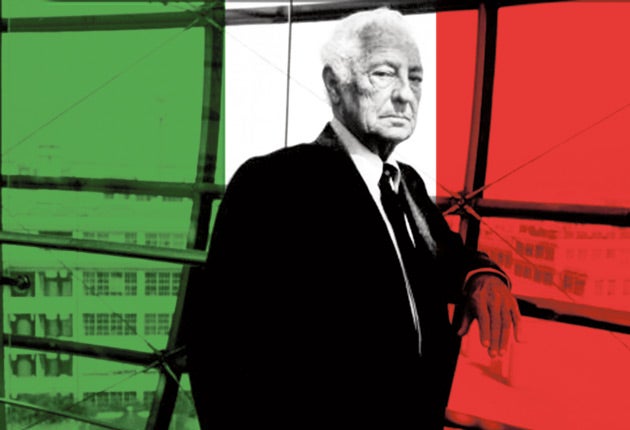Fiat rides to rescue of ailing Chrysler
The bankrupt auto giant that helped define the American century has finally been saved by the surprise intervention of a resurgent European rival. Stephen Foley reports

Your support helps us to tell the story
From reproductive rights to climate change to Big Tech, The Independent is on the ground when the story is developing. Whether it's investigating the financials of Elon Musk's pro-Trump PAC or producing our latest documentary, 'The A Word', which shines a light on the American women fighting for reproductive rights, we know how important it is to parse out the facts from the messaging.
At such a critical moment in US history, we need reporters on the ground. Your donation allows us to keep sending journalists to speak to both sides of the story.
The Independent is trusted by Americans across the entire political spectrum. And unlike many other quality news outlets, we choose not to lock Americans out of our reporting and analysis with paywalls. We believe quality journalism should be available to everyone, paid for by those who can afford it.
Your support makes all the difference.Barack Obama made a call for US drivers to "buy American" yesterday, in the same breath as he announced a plan for the Italian carmaker Fiat to become the major shareholder in Chrysler, an American icon with a history stretching back to 1925. Chrysler filed for bankruptcy yesterday afternoon in a Manhattan courthouse just a few miles from the giant skyscraper which bears the name of its founder.
It was the first bankruptcy of a major US carmaker since Studebaker sought protection from its creditors in the depths of the Great Depression in 1933, but the president presented it as part of a rescue plan that would give Chrysler "a new lease on life".
For the company, the filing is the culmination of a long period of decline, dramatically accelerated by the slump in car sales since the financial crisis erupted. And for Fiat, the shake-up being proposed hands it a juicy opportunity to get a foothold in the US market, through a potentially lucrative new alliance.
For a seething gaggle of Chrysler bondholders, meanwhile, the decision looks like it will force them to take big losses. They had held out against a plan to restructure, but now face having it imposed upon them by a judge. Mr Obama was scathing in his criticism of this "small group of speculators". Everyone needed to make sacrifices, the president said. "This is a company that has a particular claim on our American identity, a company that helped make the 20th century an American century... It's been a pillar of our industrial economy, but, frankly, a pillar that's been weakened by papering over tough problems."
Chrysler has been kept afloat since December only on a steady drip of money from the US government, and has eaten through $4.5bn in taxpayer loans. An Obama administration task force had been huddled with the company for weeks trying to come up with a rescue plan, and had hoped right up until Wednesday that enough of a majority of the creditors would come on board the Fiat-sponsored deal so as to avoid using the bankruptcy courts.
Instead, the company is moving into dangerous territory, with the main fear being that car buyers will shun its brands, which include Jeep and Dodge trucks, even though the government is already backing the company's warranties. "If you are considering buying a car, I hope it will be an American car," Mr Obama said. "I want to remind you that if you decide to buy a Chrysler, your warrantee will be safe."
The administration will be closely watching the effect of the bankruptcy on consumer confidence, not least because it may have to repeat the exercise next month, when the even bigger carmaker General Motors faces its own bailout deadline.
The "Big Three" US car manufacturers – GM, Chrysler and Ford, which is in better shape because it raised money before the credit crisis – have seen their domestic market share continually eroded by foreign manufacturers, such as Toyota, with better reputations for reliability. The spike in petrol prices two years ago pushed consumers away from the gas-guzzling SUVs that had been the US industry's stock in trade. And then finally, the financial crisis struck, frightening consumers away from dealerships and drying up the pool of money available to fund car loans.
US car sales last month were 37 per cent lower than a year ago and Chrysler's performance was worse than average. It has slipped to below 12 per cent of the domestic market, devastating for a company that was already loaded up with debt when the private equity firm Cerberus Capital bought it in 2007.
The Big Three have always argued they are hamstrung by the legacy costs of paying pensions and healthcare benefits for millions of retired workers, and the restructuring plan helps them shed some of these obligations. More than half the shares in a restructured Chrysler will be owned by the union-run benefit trust, which is getting the stock instead of cash. Fiat will have seats on the board and will help run Chrysler, providing fuel-efficient manufacturing technology and building at least one of its own vehicles in a Chrysler plant.
The US government will lend Chrysler up to another $8bn to keep running as it implements its restructuring plan. Canada, where Chrysler has significant manufacturing operations, will also put in money. The aim is to save hundreds of thousands of jobs at Chrysler, its suppliers and its network of car dealerships, which could be under threat if the company collapsed entirely and had to be liquidated.
Join our commenting forum
Join thought-provoking conversations, follow other Independent readers and see their replies
Comments